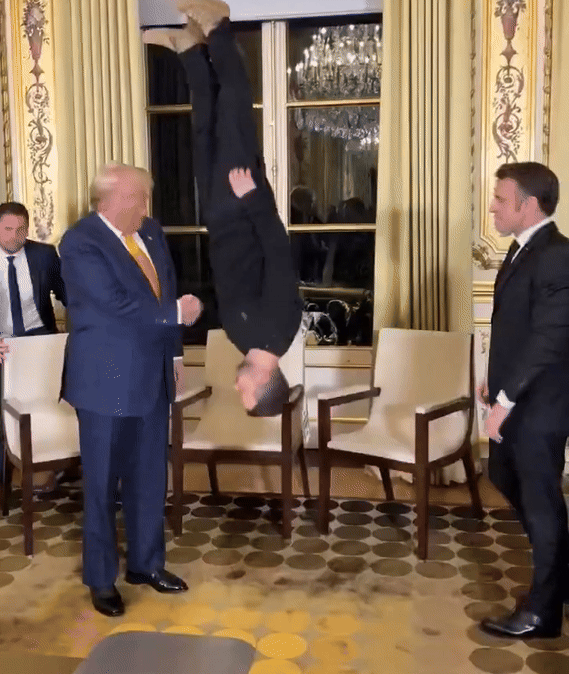Trump's Grand Re-Entry into Global Chess
Is Trump Capable of Learning from History, or Will His Newly Appointed Swamp Creatures Devour His Legacy?
In his first international jaunt since reclaiming the presidency on November 5th, Donald Trump was ushered into the Élysées Palace with all the fanfare one might reserve for a monarch, not a president, for the ceremonial reopening of the 900-year-old Notre Dame Cathedral, which was gutted by fire in 2019.
There, he was met by a visibly exhausted French President Emmanuel Macron, fresh from surviving yet another political skirmish, a no-confidence vote. This is the man, after all, who's been steering France through its own political quagmire while the EU watches, hoping he doesn't drag them all down with him.
Macron was not alone; he was shadowed by the ever-servile Ukrainian President Volodymyr Zelensky, who scurried behind like a beggar at a feast, desperate for scraps of attention or perhaps more American dollars. Trump, during his hiatus from the Oval Office, has left the U.S. in a state of political lethargy under Biden, who might as well have been vacationing in Angola for all the good he's done.
If you appreciate my articles, please consider giving them a like. It's a simple gesture that doesn't cost you anything, but it goes a long way in promoting this post, combating censorship, and fighting the issues that you are apparently not a big fan of.
Their meeting, a mere 35 minutes but likely an eternity for Zelensky, was undoubtedly a strategic discussion on how to keep the U.S. financially entangled in Ukraine's ongoing conflict with Russia. Here's Zelensky, with his hand perpetually out, draining American resources, while Trump, who has historically questioned the value of NATO, must decide whether to continue this nonsensical charade of international altruism.
Meanwhile, in what can only be described as a last-minute cash grab, the Biden administration, in its final throes of power, threw another $1 billion into the Ukrainian furnace, hoping to secure their legacy or perhaps just to spite Trump's incoming administration.
Post-Ukraine, Trump didn't waste time; he met with Prince William at the British Embassy, ostensibly to reaffirm the so-called 'special relationship'. But let's not delude ourselves; this was Trump showing that he's back, and claiming that he's not here to play nice with the globalist playbook that has left nations like Britain and the U.S. economically and politically compromised.
“The United States should have nothing to do with it. This is not our fight. Let it play out. Do not get involved. We should not send one penny to Damascus or any other party involved. We cannot let the warmongers in the White House succeed in starting WWIII.”
The so-called 'civil' war in Syria, which has been anything but civil, can trace its roots back to at least 2006, when leaked diplomatic cables revealed the U.S.'s long-standing obsession with toppling Syrian President Bashar al-Assad.
By 2011, what was marketed as a grassroots uprising quickly devolved into a bloody conflict, with the U.S. playing puppet master to its sponsored 'militants.'
In 2015, President Obama, egged on by the ever-ambitious Hillary Clinton, decided that air strikes and special ops weren't just for Hollywood movies but for real, live, sovereign nations like Syria.
Then, during her 2016 presidential campaign, Clinton, with all the hubris of a would-be empress, promised to enforce a no-fly zone over Syria, a move that would have undoubtedly escalated the conflict into an even greater humanitarian disaster. This was not about protecting civilians; it was about securing geopolitical leverage, or perhaps just another notch in her belt of foreign policy 'achievements.
Fast forward to now, and we see the fruits of this meddling. Assad, who has been painted as the villain in this tragic narrative, has seemingly fled to Russia, leaving behind yet another nation on the brink of an Islamist takeover.
This scenario was not just a failure of policy; it was the predictable outcome of a strategy that used 'militants' as tools for regime change. And what does Trump do? He once stated, with the candor of someone who speaks before they think, “I left troops only for the oil.” But now, with Assad's departure, his policy seems as forgotten as last year's campaign promises.
The irony here is that while the U.S. was busy playing geopolitical chess in the Middle East, another game was being played on the economic board. Trump's aggressive stance against BRICS, threatening them for even considering to challenge the dominance of the U.S. dollar, shows a fundamental misunderstanding or perhaps a willful ignorance of why BRICS exists.



